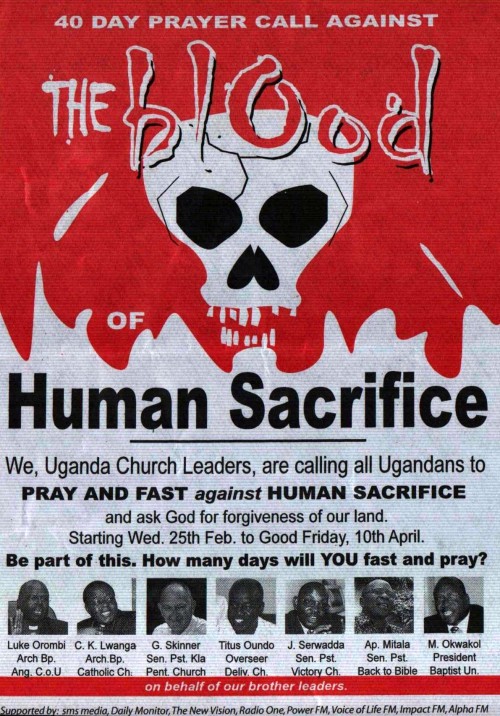We see examples of prayer and fasting in the pages of the bible and it is encouraged by churches spanning the globe. “How then, and under what circumstances,” you may ask, “do churches in Uganda engage in this spiritual exercise?” Just look at this quarter-page leaflet found in many waiting rooms and other public areas these days.
Human sacrifice is often brought on when a desperate (and greedy!?) person approaches a witchdoctor to help secure success in business or personal dealings. The witchdoctor’s prescription can include various parts of the human body. The status of the person who gives their life in the acquisition of these parts and the specific body parts requested also play a role but I won’t go into that here. There has been a rash of these incidents lately, hence the 40-day call to action (above).
I was preaching on Elisha and Naaman last month when this issue was at the top of the news cycle, as you can see by the front page of the Red Pepper.
In the message I referenced how desperate people the world over will ascribe healing powers to earth or water: Hindus and the Ganges river in India; Lake Chitagata in western Uganda; The Prophet Kakande who built a church building in Kampala on a spring; Nanyonga who claimed to heal HIV/AIDS with soil. (A huckster will often peddle this hope to the desperate and reap a great financial benefit.)
It seems that we even find healing waters in the pages of the bible. Naaman is quite desperate in 2 Kings 5 when the Prophet Elisha instructs him to dip seven times in the Jordan River and be healed from his skin disease. All this forces us to think about the things that we do when we’re desperate. Some of us will steal. Some will turn to suicide or prostituion. Others will become a fake healer and set up a shrine attached to a small deity or peddle earth and water. A few will even turn to witchdoctors and human sacrifice.
Naaman, in his desperation, does follow the prophets instructions. By his bold confession of faith Naaman acknowledges that it was the Lord God that healed him and not the water. Thankfully we have a God who is absolutely trustworthy to carry us thru desperation. He has real power for healing and forgivness and it cannot be bought or sold like the power of a witchdoctor. The things of God are absolutely free. He has given us Jesus–the Great Healer–with no strings attached!




Leave a comment